|
Vidas: Hi, guys, this is Vidas.
Ausra: And Ausra V: Let’s start episode 553 of Secrets of Organ Playing Podcast. This question was sent by Agnese. And she writes: Dear Vidas! Your advice is great! My dream for organ playing is to do some improvisation and to be able to sight-read the score. For some practical reasons--chorals within church service, for example. I have seen Your videos about improvisation on Major and Minor chords and rhythmical canon. These were pretty simple and I could try them. I got very inspired afterwards, thank You about that. So, answering question—what is holding me back from my dream—lack of experience (for sight-reading), lack of ideas (for improvisation) and lack of self-confidence—in general. But I am pretty sure, that experience, techniques and ideas I can get from You or some other smart person. So—advice for improving sight-reading and some more simple (easy understandable) improvisation ideas would be really great from You! With best wishes - Agnese. V: I think we could say that some of those videos that I put on Youtube that I maybe share with people from my improvisation experience, might be helpful, right, and Agnes is saying that major and minor chords and rhythmical canon are helpful to her. What can I say? Do you like major and minor chords? They’re the basics, right? A: Yes. That’s a good question. V: Have you ever tried to play a C Major scale, C Major scale, but harmonized only in major chords? A: No, I haven’t. V: But you know how would it sound, right? A: Yes. V: Imagine. A: Yes. V: It sounds very weird but this weirdness is quite colorful. Or minor chords. Imagine—C D E F G A B and C. Instead of playing only with white keys, you would C Major chord on the note C, D Major Chord on the note D… A: Yes, yes, I imagine that. But since I’m teaching the harmony course of the common period it’s kind of strange for me. I wouldn’t let my students do that. V: I actually did exercises with them. We sang in three voices—soprano, 2nd soprano and alto, I think—for kids voices. And we would harmonize the scale up and down this way. Or maybe I think we would sing an exercise like a melody, harmonizing in major or minor chords. That would be weird but they wouldn’t protest. A: I guess that’s why you are not teaching at school anymore. V: Why? A: Because of all these experiments. V: What do you mean? A: Well… V: Say the truth. A: It’s not on the program. V: It’s not on the test? A: Yes, that’s right. V: I know. You know, but what’s on the program might be, might be not always something that I wanted to do, you know. A: But rules are rules, so program is program. V: Do we always have to live by the rules? A: Hmm, well, not always, but, work I guess, yes. V: In our work, yes. That’s very particular school which really emphasizes the rules. But yes, major, minor chords, that would be very simple way to harmonize a melody but creatively, not in tonal harmony, but something that would be weird. I think I’ve written a few compositions like that. In particular, variations on the Christmas tune Adeste Fideles. It was dedicated to our friend Paulius Grigonis. I remembered when he was planning his recital at Vilnius Cathedral, and I offered, ‘Paulius would you like me to create some music for you?’ And he said. ‘okay’, you know. And I was so excited and created six variations out of major and minor exclusively. And of course they were too difficult for him and he didn’t play. A: Yeah. Nobody values your great ideas. V: Nobody from our close circle of friends, that’s for sure. But there are others who live farther away, maybe across the ocean. What about, Ausra, what about canons, rhythmical canons? She means, Agnese means that it’s not a direct canon like, one voice would strictly follow another voice by a certain interval or a certain rhythmical pattern. But I mean that the melody can be similar but a little bit different. Intervals might be a little different but the rhythm has to be strict. Just like Franck would do, would have done, for example, in some of his organ works. It’s not a strict canon but rhythmical canon. Have you seen that? A: Yes, I have seen it. In many cases I think that’s a great idea to improvise on it. But of course if I would be a beginning improviser I probably would choose variation genre. It seems the easiest way for me to improvise something. V: You’re right. Canon requires more focus on two voices. And variations can be quite simple, less complicated that canons. Although when you only have two voices that’s not too many things to think about, right? Two voices. Right hand and left hand. And let’s say it’s in 3-4 meter and right hand starts with three notes in quarter notes and then stops for entire measure. And at that moment the left hand enters and plays three quarter notes. And then stops again but at that moment right hand starts to move, you know. It’s like a dialogue. A: I know but you might get bored after a while by playing only two voices. And if you are doing variations on them, variations might be based on that kind of canon. V: Yes. Just one variation. A: Yes. V: Mmm-hmm. Exactly. If you do canons for a long period of time, let’s say more than two minutes, then it’s very difficult to keep it interesting, right, unless you spice up the meter, or spice up the rhythms, add the more intricate combinations of rhythmical values, syncopations, dotted notes, even rests. Not necessarily all the quarter notes—one, two, three, one, two, three. The interest would be bigger. Of course you can do more interest in tonal terns, right Ausra? You can add different keys, you can add different colors, which might be… A: Yes, yes, that’s possibilities too. V: also interesting. You know there are seven elements of music, right, which generally comprise any tonal musical composition, composed up to, let’s say, beginning of the Twentieth Century. And after that it’s more varied than that. There are various other elements involved in various other techniques when composers got beyond tonal style. But those elements are what, melody, rhythm, harmony—what am I missing—dynamics, on the organ, registration, let’s say texture and then there’s seven for this form. Those seven elements are inherent in any, let’s say, keyboard composition or organ composition that we play today. And if you think about each element separately and keep it interesting, let say, interesting rhythm, interesting melody, interesting dynamics, or interesting form, then in general your improvisation or composition will be more interesting too. A: Yes, but you know, I wouldn’t agree with this sort of point of interesting form. I would say that clear form is better definition for me at least. Because what you mean by interesting? V: By mean, yes, those, are two different things. Clear form could be A-B-A. A: Yes. V: Three part form, right, with recapitulation. A: Usually that’s what I like about the piece of music that I can understand a form of it. Because if it’s too interesting I might not be able to comprehend what it’s about. V: But what if the form is complex enough, but on the edge that you could still understand where the recapitulations are. You know there is like, there are maybe two themes which are reoccurring from time to time and your attention is drawn to them from time to time and you are not lost. But besides that, what composer does, or improviser does, inside of the piece, is quite strange, you know. It’s difficult to analyze but you hear some thematic re-occurrences which you can recognize but it’s difficult too. But that’s what I mean by saying it’s interesting. A: Okay. V: Convinced? A: But I thing for a beginning improviser it would be too difficult to achieve. V: Yeah! The easiest form is probably to deal with A-B-A form, when you present one idea, and then present another idea, and then go back to the first idea. Strictly or a little bit more variation if you want more interest. Yes? A: Yes. V: And never underestimate the value of improvising on just four notes. Pick any four notes and play anything you like on those four notes for let’s say, ten minutes, and see what happens. Of course, try to keep it interesting. A: What else can I say? V: You can say that I’m right! Can you say that? A: Maybe not. V: Not today? A: Not today! But as Agnese talks about sight-reading, lack of experience, I think she just needs to practice more. V: Yeah. With time it will come. And she acknowledges that. She simply needs to focus on the now. A: Yes, yes. V: Not on the long term results which are not visible yet. But on today. A: And I think when she will practice more, she will get more new ideas. They will come up to her during her practice. V: Yeah. It’s like eating breakfast. Before you eat breakfast you might not want to eat breakfast, but once you start eating breakfast, you want more and more. Right Ausra? A: I don’t think that this is such a good comparison, but… V: It works for me because I’m hungry. I haven’t eaten breakfast and it’s early in the morning. So, guys, I hope you will find this conversation useful. Apply our tips in your practice. Let us know how it goes. Keep sending us more questions. We love helping you grow. And I will go to eat breakfast. This was Vidas. A: And Ausra. V: And remember, when you practice… A: Miracles happen!
Comments
Since the end of May I've been a customer of Distrokid. At first I just wanted to try it out so I uploaded 5 tracks just to see what happens and forgot about it. But since mid-November I got serious thanks to seeing the success my friend @contrabourdon had there and I've been uploading my music (and occasionally Ausra's too) to Distrokid daily and saw my stats increase every week dramatically.
But just around Christmas 2019 something changed. I saw a lot of yellow tracks on my dashboard which meant they are still processing. For a few days that is OK. Maybe for a week or two. But nothing changed even after 3 weeks. So I wrote the following message to Distrokid support: Hello, I've noticed that my recent 100+ tracks of mine stopped processing and are marked yellow for some reason (they are not in any stores either) for 3 weeks now. Earlier they turned green quite quickly, that's why I've started worrying. Thanks for your help! I had to open a couple of support tickets but here's what they finally wrote: Hi, Hope you are well. We've been notified by stores and streaming services that one or more of your releases has been rejected due to editorial discretion. Unfortunately, stores are no longer accepting releases from you via DistroKid. You’ll need to try another distributor for future releases. Please understand that DistroKid is unable to assist with reversing this. We have no other information or context, and we are unable to get involved or take sides when this occurs. We’re just the messenger, passing along this info to you in hopes you find it helpful. We understand that this email is probably frustrating to you, and we regret having to be the messenger of bad news. However, we hope this email is helpful, and we thank you for your understanding. We wish you the best of luck moving forward with another distributor. Then I asked: Did they state the reason for rejecting my tracks? And their final response was: I'm very sorry about this, but unfortunately, this is all of the information that we have. Please try another distributor. Maybe the founder of Distrokid (/u/pudjam666 on Reddit) could know what's going on? I wasn't breaking any rules. I didn't get any warnings. It's weird. This is a really lousy customer support. If I hadn't pushed through with my tickets, I wouldn't have found out even that I was rejected by the stores. Unfortunately my trust with Distrokid has shaken because what are the chances ALL the stores would reject me at the same time? Something's smells fishy here... On the other hand what if it's true and if I move to another distributor only to be rejected again by the stores and streaming platforms? Now I'm worried about my YouTube channel too. I have done nothing wrong. Didn't steal anybody's content. Just used my own recordings with my personal playing either my own compositions and improvisations or works by other composers properly cited. So much for putting your trust on centralized platforms... Can the need for censorship resistant decentralized blockchains like Steem be any more apparent than this?
Thank you everyone for participating! You all made us very happy with your entries. We have selected the following winners.
Have you ever wanted to start to practice on the organ but found yourself sidetracked after a few days? Apparently your inner motivation wasn't enough.
I know how you feel. I also was stuck many times. What helped me was to find some external motivation as well. In order for you to advance your organ playing skills and help you motivate to practice, my wife Ausra - @laputis and I invite you to join in a contest to submit your organ music and win some Steem. Are you an experienced organist? You can participate easily. Are you a beginner? No problem. This contest is open to every organ music loving Steemian. Here are the rules
Would you like to learn Offertoire funebre in F# Minor from L'Organiste by Cesar Franck?
I hope you'll enjoy playing this piece yourself from my PDF score which will save you many hours of work and help you practice efficiently. Thanks to Jeremy Owens for his meticulous transcription from the slow motion video. What will you get? PDF score with complete fingering written in. Basic Level. 3 pages. Let me know how your practice goes. This score is free for Total Organist students. Check it out here
Would you like to learn Poco Allegretto in G Major from L'Organiste by Cesar Franck?
I hope you'll enjoy playing this piece yourself from my PDF score which will save you many hours of work and help you practice efficiently. Thanks to Jan Pennell for her meticulous transcription from the slow motion video. What will you get? PDF score with complete fingering written in. Basic Level. 1 page. Let me know how your practice goes. This score is free for Total Organist students. Check it out here
Vidas: Hi guys! This is Vidas.
Ausra: And Ausra. V: Let’s start episode 554 of Secrets of Organ Playing Podcast. This question was sent by Sjouke. And he writes, Hello Vidas, It has been a while since I wrote to you, maybe last spring. My memory is not that great anymore, as we get older it seems that is one of the things that seems to stand out more being forgetful that is. My question to you is this, quite a few years ago I was pretty good playing fantasy and choral by Jan Zwart, Translation. A mighty Fortress is our God, you may not know that piece for he was an outstanding organist and composer as well, but getting back to my problem and question, I just picked up that piece again and I found something quite shocking that I have forgotten how to play that piece of music totally. For about a week now or a little more, I am practising this piece but I do not seem to be getting anywhere. Just as I think I am getting it together again I come back the next day, it is as though it is back to the first day again. Now to be fair to you and your wife, I suspect I have had the suspicion of having had a few minor strokes, not noticeable on my speech, but more so I forget so many things as though I am really out of it and that usually lasts a short time a couple of hours, but it usually comes back but not in my organ playing I am afraid to say. I had it once that I got up one Sunday morning and had to play, practised all week and got up Sunday morning did not know what I had practised, till I looked at my notes and wonder if I really did practice all that I had written, I noticed in my playing, it was not all that bad, I do not think anyone else noticed it, but I did. But what I want to know is that before mentioned piece of music will I be able to get it back, I am starting to lose hope. ~Sjouke V: So Sjouke...probably this problem is related to his strokes, right? Because memory loss is one of the symptoms, right? A: Yes, yes. V: Could be long term or short term. I’m not a physician of course, but I suspect that might be the case. When a person practices a piece of music one day and completely forgets the next day. A: Well, yes, but when he talked about A Mighty Fortress is Our God, he shouldn’t so surprised, because he hadn’t practiced that piece for a few years. And even for a professional, and even for a good professional, if it’s a difficult piece and you come back to it after a few years, you might have to relearn it at all. V: The real test would be to learn a new piece, not an old one. And then come back to it, a month later, let’s say, and see if he can forget it or can remember it, right? Because Jan Zwart’s A Mighty Fortress, as you say, was learned a few years ago. To me also, it would be very difficult to come back to it, depending on the level of difficulty of course. But if it’s a difficult piece for my own level, then I have to spend let’s say, at least a month for it. Maybe he worries too early about it. Maybe he just needs to spend more time. A: More time. Yes. And what I could suggest for Sjouke, he might record what he’s practicing. And then if he will not remember what he did last time, he might listen to the recording. He needs, you know, he’s taking notes, but I think sometimes I think a recording might be better. Because sometimes you cannot describe on the paper what you have learned and what you have done. But if he would listen to what he can play, let’s say, yesterday - it might make things easier for him. V: You’re right. It is said that a picture is worth a thousand words, so how many words is worth a recording? A: Yes, and he might record the next practice and then compare those two rehearsal sessions, and see how things sound. But of course, if each, we all sort of have to overcome some obstacles. It’s not an easy thing, especially after a stroke. And in general, sometimes people lose their confidence about things. For example, yesterday, my mom threw away the old socks of my father. But she didn’t tell him about it. And then she left, she had some business outside of the home, and my father was left alone, and he is usually not very good about finding his clothes. V: Who is? A: Well, I guess many men are not good at this kind of expertise. V: Including me. A: Yes. But my father started to look for his socks. He knew where he placed them, but could not find them in that spot. So he kept searching throughout the entire place, and finally he decided to look at the refrigerator, maybe he put them in there! V: Really? A: Can you imagine that? V: He looked in the fridge? A: I think it’s hilarious, but on the other hand, it’s very sad. Because he lost his confidence. V: And did your mom confess? A: Yes, she told him after she came back, but I asked her why she didn’t tell him that she just threw them away, and she told, I forgot about it, so. V: Funny. A: What can you do, you know? V: Yeah, it’s funny when you say that. A: But it’s not funny when I’m thinking about my poor father looking for his socks for over an hour, and looking at the fridge. V: Yeah. I was thinking about something to say while you were sharing that story, and I now remember what I was meaning to say. That the fact that Sjouke still practices is very good. That if he stopped practicing since he lost hope, and said, “I’m not making any progress and it’s not working,” then I think his memory might be even worse, right? Even though it seems like he’s forgetting things, it’s still better than not practicing, yes? A: Yes, I believe it, yes. I believe that sometimes not the result is the most important, but the process. And the process of practicing might be really beneficial for Sjouke. V: Mm hm. And when you get into a routine, this routine is something to look forward to every day. It gives sense of security for a person. Sense of meaning, purpose. And at this age in his life, this is very important. A: I think so. V: Ok. This was Vidas A: And Ausra. V: Let us know how your practice goes, guys. If you have similar problems and you keep forgetting things, maybe organ playing helps you or not, we are very interested to know. And keep sending us more of your questions, because we love helping you grow. And remember, when you practice, A: Miracles happen.
Vidas: Hi, guys, this is Vidas.
Ausra: And Ausra V: Let’s start episode 550, of Secrets of Organ Playing Podcast. This question was sent by John. And he writes: I believe you and Ausra would have had quite a bit of experience organizing the church music program in the US, including choirs? Would be great to learn some tips from you guys! I would enjoy getting some advice from you on keyboard technique and finger accuracy. V: How should we start, Ausra? A: Well, I guess, yes, we have some experience organizing church music in America. But concerning choirs, I would say we have more experience organizing church music in Lithuania. Because before leaving to the United States we worked with two choirs in St. Johns church in Vilnius. V: Yes, and in America we were organists, not… A: Yes. V: music directors. A: So… V: In Lithuania, if you want to lead the choir and direct the musical life within the parish, within your congregation, you needed to be in charge, not only of the choir, not only of choir rehearsals, but also think about what musical activities you want to do between Sundays. A: Yes. And if we are talking about our choir groups in Lithuania that we had before going to the states, we had two choirs; one was a choir where mostly professionals sang, or at least people who had some professional musical education. And we sang, well, early music mostly. And I mean really early music, like Renaissance polyphony. V: We even early sang the earliest surviving polyphonic Requiem which is by Johannes Ockeghem. A: Yes and we also sang some masses of Jacob Obrecht and other nice Renaissance composers. And of course we did some Bach, Bach’s choral music as well. And it wasn’t very easy to keep this group because we were all, of them basically, almost professionals, or professional. And we asked them to come to church to sing each Sunday for free. But we, well, kept going it for a while, for quite a while. But of course when we left to the states, all this group disappeared. And another choir was the youth group. And they sang sort of easier music, like pop, pop, Christian pop music. V: Yes. A: With various instruments, with of course keyboards and guitars and I would play my recorder and we had little girl who would play some percussion. V: It was fun. A: Yes. And it we had some music that we brought with us from Austria. And actually I created the Lithuanian text for that music, so, we sang those. V: In general, if we are talking about directing choral life around your congregation, you need to satisfy three, sometimes conflicting sides—yourself, right, musically it has to be pleasing to yourself. If you are not doing the work you are proud of, I think you will not continue to do it after a while. A: Well, but you know, in this second choir we welcomed everybody who wanted to sing. And not everybody even had to know like good musical pitch. V: Mmm-hmm. A: So, and some would sing out of tune. But because in this second choir we had lots of members. V: Mmm-hmm. A: So we sang loud enough in order to diminish those who cannot sing well enough. V: But what I mean is we were able to do both choirs because we really loved early music at that time. We were able to reconcile two different styles, two different even skill set levels, advancement levels of those members because we really loved early music and we understood if we only sang early music with that, the first choir, we would never be able to satisfy what congregation needs and wants. A: Well, we did hymns too, of course, not... V: Yes, but for the second mass they wanted some light music, right? A: Yes, for youth. V: For youth. By the way, for the second mass right now, they have gospel music, another group, quite well know group in Vilnius. And we’re not in charge anymore of any choral activities in that church. We’re only in charge of organ activities within the university. So, so if John is thinking about leading a musical life, including choral life in his congregation, I think he needs to think about what he wants, what congregation wants, and what his choir members want, also. A: And what they can. V: Mmm-hmm. A: Because you might want to do it but you cannot have ability to do it. V: And you need to do sometimes, you sometimes have to meet them in the middle. If they want to do one thing and you want to do another thing, maybe you can agree to meet somewhere in the middle, like a compromise. That’s possible, if they’re open for compromises. Sometimes not. Sometimes they’re very direct and very specific about what they want. But I guess even in that situation, if you are forced to do something that you don’t want to do, maybe you have, you can have a corner of musical activity that you enjoy doing in that congregation. And because of the opportunity to rehearse with that ensemble for example, or, I don’t what John enjoys, maybe play organ music right? Maybe he can do something else as well, in addition to that, like a compromise, like a service for the congregation. But maybe I’m over exaggerating. Maybe he would enjoy doing all kinds of musical activities, and maybe that’s not a problem for him, right? A: Yeah, sure. V: So then, John was also asking about a couple of other things—advice about keyboard technique and finger accuracy. We could discuss this in another episode, right, because it’s kind of unrelated. A: Yes, unrelated to the first half of the question. V: Okay guys. So stay tuned for our next episode and we will discuss the rest of John’s questions. Thanks for listening. This was Vidas. A: And Ausra. V: Please send us more of your questions. We love helping you grow. And remember, when you practice… A: Miracles happen!
After I uploaded 10 tracks from my YouTube channel archives to Distrokid today, I thought of creating another piece for the organ. This time it was Part 5 from my cycle Organ ABC. It starts from letter E and I named it Echo.
Echo on the organ might mean two things - a separate manual on an organ with more than 2 manuals or it could be a compositional technique devised to create an echo effect. I chose the latter. I wanted to create an effect of a dialogue between two layers of sound - loud and softer. It is in the mode of F and I improvised it on my MIDI keyboard which was connected to the Sibelius software on my computer. After I played it, I went back and renotated the performance so that it would look legible on the score. I also changed the meter often and disposition of voices from time to time. For music in a new meter to look comprehensible I had to renotate the rhythms too - usually remove tied notes. As in the previous piece, here too I had a fun time with parallel fifths in both hands. When this was done I printed out the score and sat down on my organ bench and played it through while pointing the camera at my fingers so that later @drugelis can transcribe the fingering from the video. I dedicated the Echo to Pastor de Lasala, OAM (@tormus1958 on Steem) in order to show my appreciation of his relentless participation in our Secrets of Organ Playing Contest week after week. Let me know what you think. What will you get? PDF score. 1 page. Beginner level. This score is free for Total Organist students. Good luck in your practice and let me know how it goes. Check it out here
Would you like to learn Poco Allegretto in Gb Major from L'Organiste by Cesar Franck?
I hope you'll enjoy playing this piece yourself from my PDF score which will save you many hours of work and help you practice efficiently. Thanks to Juan Osorno for his meticulous transcription from the slow motion video. What will you get? PDF score with complete fingering written in. Basic Level. 1 page. Let me know how your practice goes. This score is free for Total Organist students. Check it out here |
DON'T MISS A THING! FREE UPDATES BY EMAIL.Thank you!You have successfully joined our subscriber list.  Photo by Edgaras Kurauskas Photo by Edgaras Kurauskas
Authors
Drs. Vidas Pinkevicius and Ausra Motuzaite-Pinkeviciene Organists of Vilnius University , creators of Secrets of Organ Playing. Our Hauptwerk Setup:
Categories
All
Archives
April 2024
|
This site participates in the Amazon, Thomann and other affiliate programs, the proceeds of which keep it free for anyone to read.
Copyright © 2011-2024 by Vidas Pinkevicius and Ausra Motuzaite-Pinkeviciene.
Terms of Service and Privacy Policy
Copyright © 2011-2024 by Vidas Pinkevicius and Ausra Motuzaite-Pinkeviciene.
Terms of Service and Privacy Policy


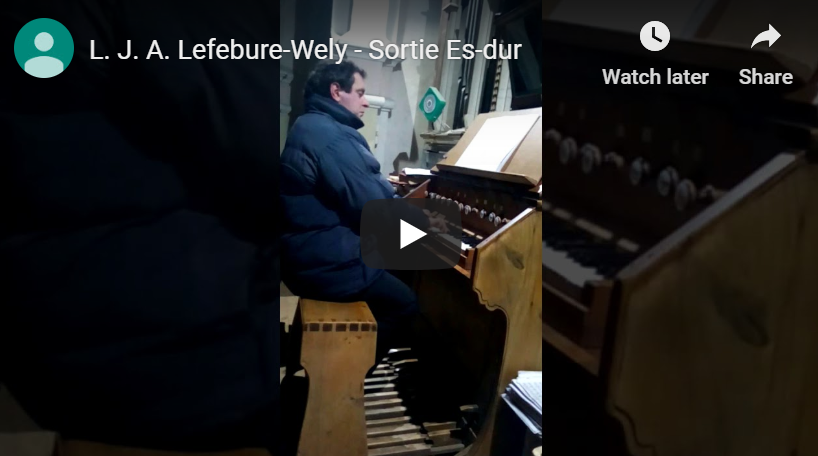
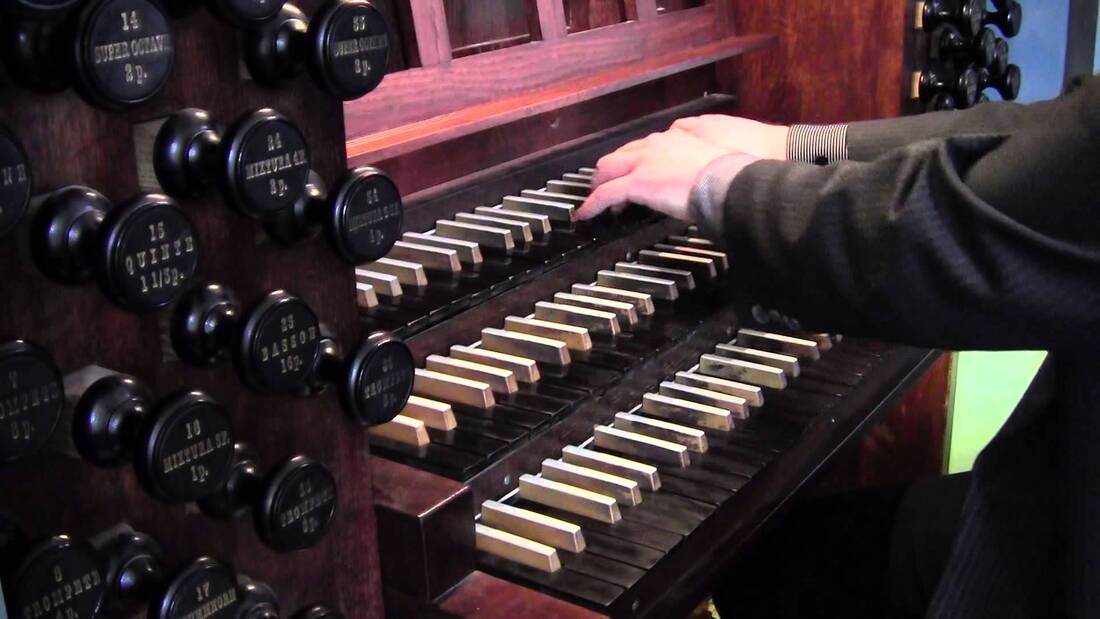
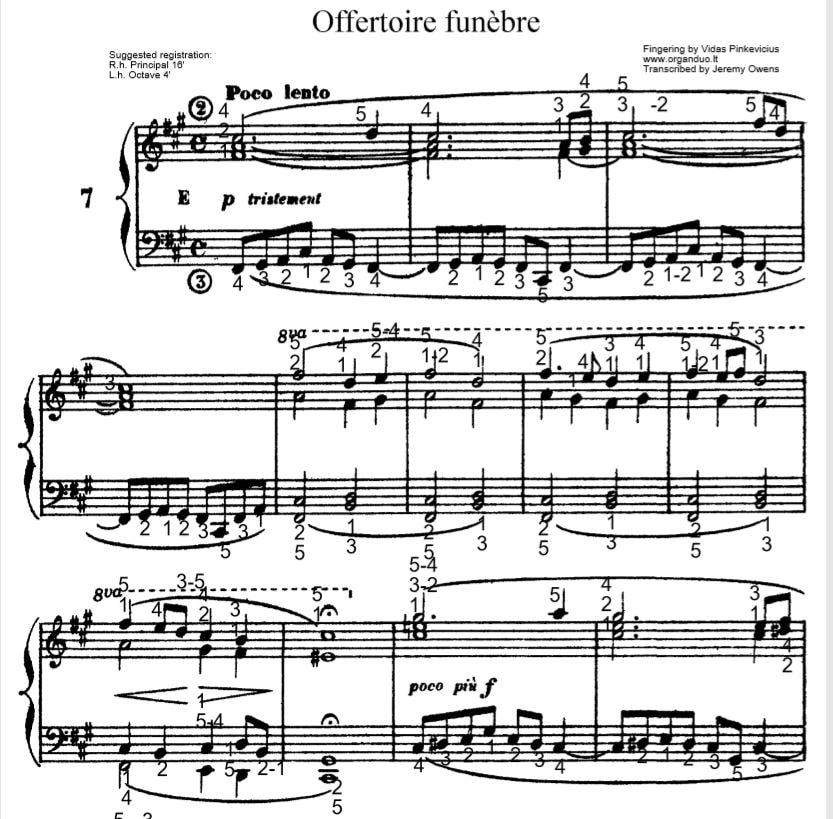
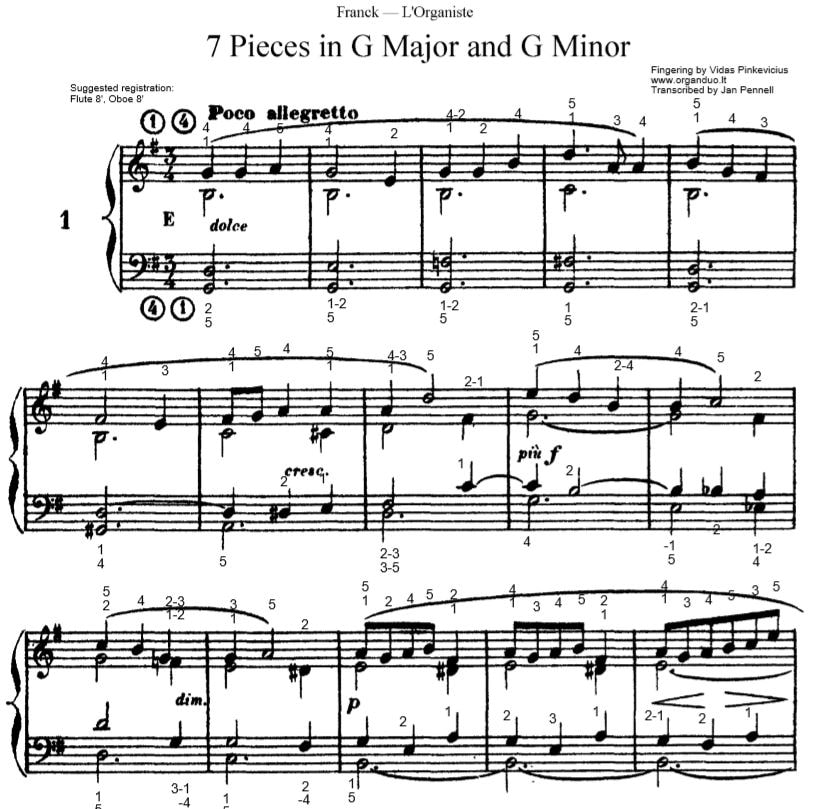
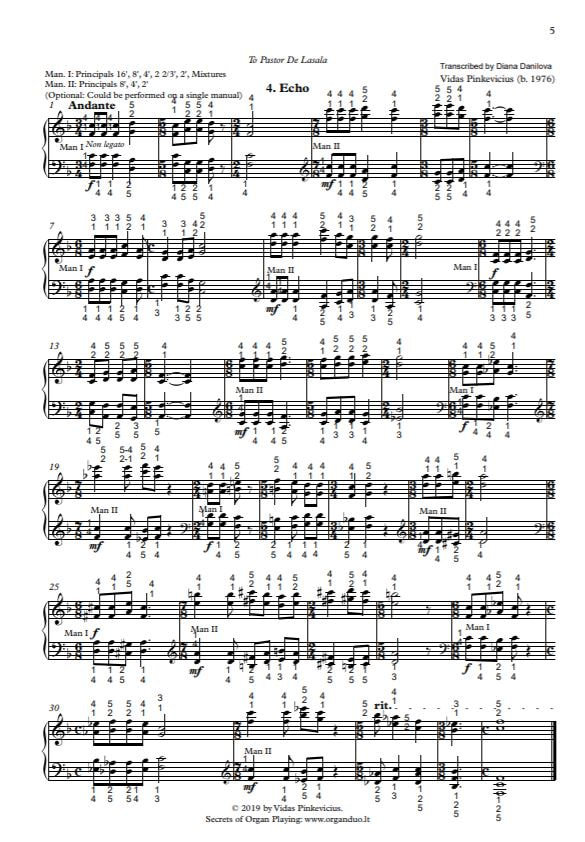
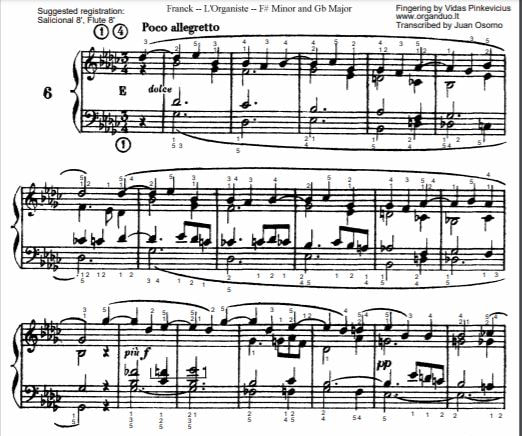



 RSS Feed
RSS Feed